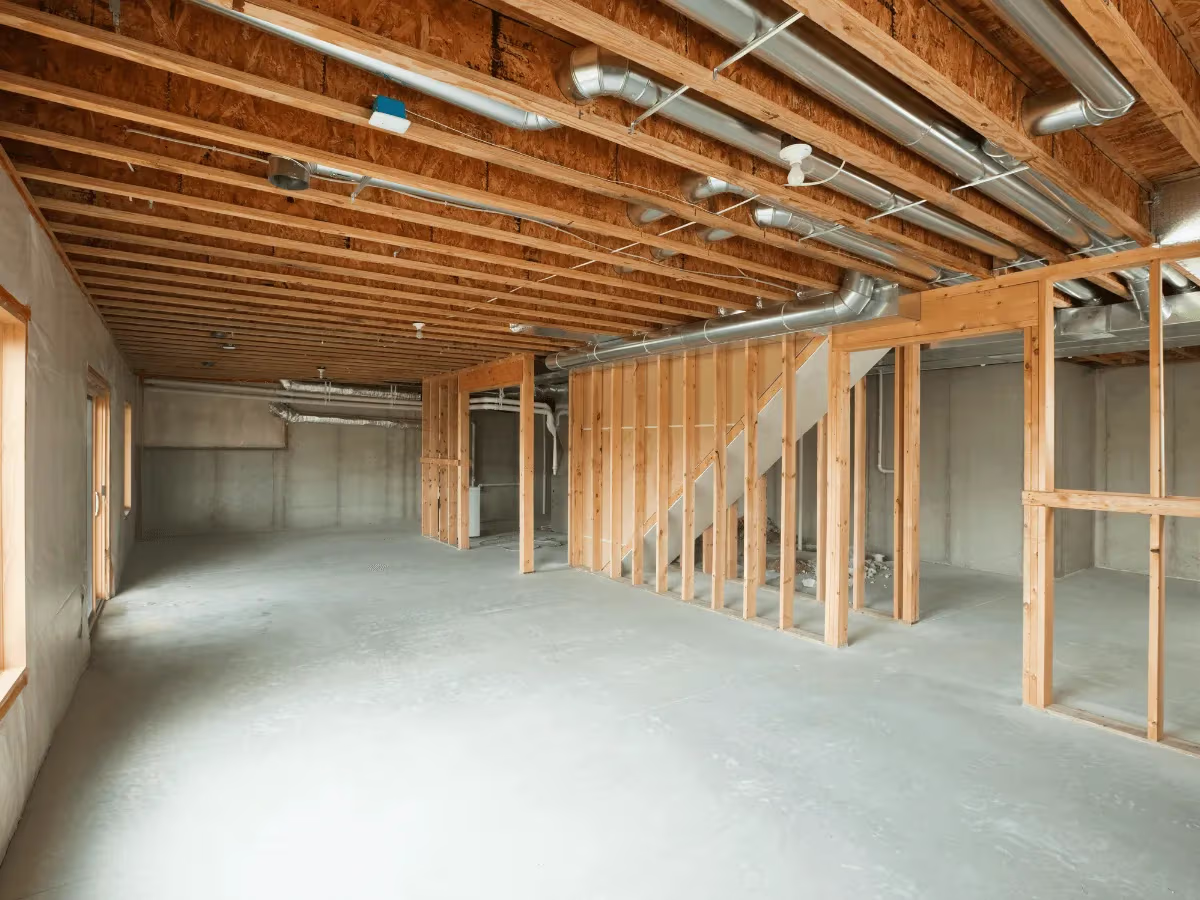An unfinished basement is not exactly the most comfortable space. Random storage, exposed pipes, or wood beams aren’t what you think of when you picture your dream basement. If you have been wanting to remodel your basement — now is the right time! Refinishing your basement will not only allow you to utilize another space in your home, but a finished basement can drastically increase your property’s value! However, before remodeling your basement, you must craft a basement plan to figure out the best course of action for your home improvement project.
From another living space to the ultimate game room or a kid’s bedroom, HOMEfix is here to help you with all of your basement remodeling needs. We are your go-to home improvement company in Colorado Springs. Our expert team will work with your family to understand what type of basement you want. We will map out your basement to understand how to make your dream come to life safely and functionally. No matter if you want a home theater, a closed-off laundry room, an art studio, a wine cellar, or any other type of basement space, HOMEfix will make it happen without going over budget.
Before getting started on your home improvement project, here are 10 things to know before remodeling your basement.
1. How unfinished is your unfinished basement?
Finishing your basement may mean a lot of different things. For some individuals, all you may need to do is add lighting and some area rugs and call it good. For others, you may want to replace your basement flooring, paint the ceiling, install additional basement walls, as well as build a full home theater, including a wet bar.
There is no wrong way to remodel your basement. Regardless of how you envision your space, do understand that the bigger your project, the longer it will take and the more expensive it will be. Therefore, it is crucial to have a solid understanding of your project so you can budget correctly and set up an accurate remodeling timeline.
2. How will you use your space?
One of the hardest parts of remodeling your basement is figuring out what direction your project will go. You may have a general idea, such as turning your basement into a remodeled suite, but it is easy to get caught up in the details.
Understand the practical details of your basement. Sure — your family may love watching movies each weekend. But do you really need a home theater with large leather reclining seats and an area for concessions? Or would you and your family be just as happy with a comfortable couch, a 4K flat-screen TV, and a popcorn machine?
While going all out for your basement remodel project is exciting, you must be flexible. Remember not to design your basement around one niche — create a multi-purpose basement that can grow with you!
3. How large is your space?
Another consideration to make before remodeling your basement is the size of the space.
First, you need to factor in how your home improvement project will impact how much space you get to work with. For example, adding additional walls or support beams will change the layout of your basement and the amount of living space you have. If you are working with a small basement, an open floor plan may be the better option.
Also, consider your furniture. A couch, table, desk, TV, pool table, and other types of furniture take up living and storage space. If you have low-hanging ceilings, try to avoid installing ceiling fans and flush mount lighting, as this shrinks your space.
Another pro tip to make your space appear larger: paint your walls a light color to make your basement look larger than it is!
4. Do you need permits for your basement remodeling project?
Before remodeling your basement, you want to ensure that you are taking the proper steps to transform your space. That means you may be required to get permits or pass inspections to finish your basement.
Cities have building codes that residents must follow. These codes may tell you anything from the proper basement ceiling height you must have to whether you need an egress window. If you are turning your basement into a rentable living space, you may need additional permits or to meet certain remodeling requirements.
Double-check that you have the necessary permits and that you are meeting the proper building codes. Not sure that your work is being completed correctly? Your city or county clerk will be able to explain more about necessary permits and inspections.
5. How is your home’s structure?
Before starting your remodeling project, you should take a look at your home’s structure. It doesn’t matter if your home is old or more recent — any home can suffer from structural damage.
Look for cracks in the walls or floors, water damage or leaks, sagging ceilings, or plumbing and electrical issues. It is a good idea to fix these problems before remodeling your basement. Why do all of the hard work of finishing your basement just to have a problem with your home’s structure down the line?
A professional contractor can help examine your home, give you the rundown on what needs to be fixed, as well as provide you with an estimate to repair the problems.
6. What is your home worth?
Figure out how much to spend on your basement in comparison to your home’s worth. That means you don’t want to over-improve your home to the point where you have lost money by remodeling your basement.
If resale value is one of your concerns, take a look at the homes in your area and the type of finished basements they have. Affordable and durable materials are your best bet. Plus, use neutral fixtures to appeal to a wide array of people. Niche fixtures or specific basement features can make it harder for a buyer to fall in love with the home when it comes time to put it on the market.
7. Have you tested for radon?
Another thing you should consider before starting your home improvement project is testing for radon. Radon is radioactive, colorless, and odorless. It is found in soil and seeps into your home. Radon causes cancer, and it is essential that you test your home for it.
In Colorado especially, half of the homes have radon levels higher than what the U.S. Environmental Protection Agency recommends, according to the state’s Department of Public Health & Environment. You can hire a licensed radon contractor to test your home. They will be able to inspect your home, run tests, and mitigate the radon to ensure your space is safe.
8. What type of flooring will you use?
Since homes are often built on concrete slabs, moisture seeps through the porous concrete which causes more moisture in your basement. Because of this, not all flooring types are well-suited for your basement.
For example, hardwood floors do not do well in an environment that has a lot of moisture. Wood can buckle and split because of water leaks and high humidity. Other types of flooring would be more durable, such as tile or vinyl. You could even leave the concrete as the flooring for your basement. Fortunately, there are many ways to go about designing the basement you want to have while finding materials that are made to last.
9. Does your basement require electrical work?
Some states have specific requirements when it comes to electrical work. Again — before starting any remodeling project, you want to be fully aware of code requirements.
For example, some states require you to install ground fault circuit interrupters (GFCI) in your basement. You should also consider how many outlets you need, where the wiring will go, and your additional electrical needs. Plus, you will want to figure out what type of lighting you’re going to use and how much of it. It is best to work with an electrician so you can have peace of mind knowing the electrical work in your basement is safe and properly installed.
10. Who will help you remodel your basement?
Before remodeling your basement, you need to decide if you will DIY or hire a professional contractor.
If you are making minor improvements to your basement and have prior experience working with remodels, you may opt to finish your basement by yourself. Yet, if you have a larger project in mind, or if you would feel more comfortable working with a home improvement company, you should research who you are going to work with before deciding on the company you’ll go with.
Make sure to take a look at their reviews, home improvement portfolio, and website. You can also ask friends and family for recommendations on local contractors. Make sure that you request multiple estimates, too!
Remodel Your Basement with the HOMEfix Experts
An unfinished basement has so much potential. From a home office to a den, there are many ways you can go about remodeling your basement. Not only will this allow your family to have another area for living space, but a finished basement adds to your home’s value. But before starting your home improvement project, there are multiple things you need to consider. For example, you need to know the size of your basement, if you need any permits, the materials you’ll use, and much more. This list is a great starting point to understanding what things you should know before remodeling your basement.
If your home has an unfinished basement that needs to be remodeled, the team at HOMEfix is here to help! As a general contractor in Colorado Springs, we can make any basement remodel idea you have come to life. And the best part? You will never go over budget with our basement renovation and remodel services. That means no more expensive surprises. Plus, our 5-year warranty has you covered in case something happens. See what the best basement remodeling services look like from HOMEfix. Ready to remodel your basement? Contact us today to request an estimate!

